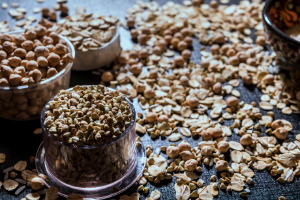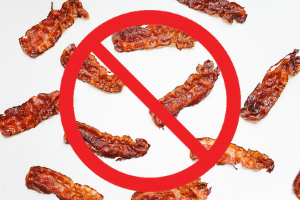Eat Your Way to a Reduced Risk of Heart Disease
Heart disease is a term that covers an array of health conditions affecting the heart such as coronary artery disease, heart rhythm problems (arrhythmias), and congenital heart defects.
Heart disease is the leading cause of death in the United States for both men and women, with half of all Americans (47%) qualifying for at least one of the three key risk factors (high blood pressure, high cholesterol, smoking cigarettes).
For more information about the relationship between diet and heart disease, check out our Meatless Monday heart-health guide.
The good news is that you can manage two of these risk factors — high blood pressure and high cholesterol —by making a few simple adjustments to your daily diet, without missing out on flavor.
In honor of American Heart Month, we’ve put together a list of tips to help you eat your way to a reduced risk of heart disease.
 Eat More Fruits and Vegetables
Eat More Fruits and Vegetables
Fruits and vegetables contain the nutrients your body needs to function properly and ward off disease. Many fruits and vegetables, regardless of how they’re prepared (sans the deep fryer), are low in calories and contain vitamins, minerals, and fiber that help prevent heart disease.
 Focus on the Right Fats
Focus on the Right Fats
The American Heart Association stresses the importance of limiting consumption of fats and oils. Reduce your intake of saturated fats from animal products, trans fats, and hydrogenated vegetable oils, and focus more on healthy fats like olive oil and canola oil. For people who need to lower their cholesterol, the American Heart Association recommends reducing saturated fat to less than 6% of total daily calories. For someone eating 2,000 calories a day, that’s about 11 to 13 grams of saturated fat.
 Go with Whole Grains
Go with Whole Grains
Whole grains provide the body with fiber and other nutrients that regulate blood pressure and promote heart health. Improve your diet by swapping out white rice, bread, and pasta for brown rice and whole-wheat varieties of your favorite carbohydrates.
 Maintain a Healthy Weight
Maintain a Healthy Weight
Excess weight and a large waist size have been found to raise the risk of developing heart disease. Reaching a healthy weight doesn’t require an extreme diet, but rather a commitment to weekly exercise and an eating plan rooted in fruits, vegetables, legumes, and other minimally processed foods.
 Limit Consumption of Red and Processed Meats
Limit Consumption of Red and Processed Meats
Processed meats contain high amounts of additives, chemicals, and sodium. These foods, which include deli meats, hot dogs, sausages, and bacon, should only be consumed in moderation.
 Think Mediterranean
Think Mediterranean
Studies show that a Mediterranean-style diet which includes a balanced proportion of fruits, vegetables, legumes, healthy oils, and monosaturated and polyunsaturated fats, reduced incidences of major cardiovascular disease.
 Avoid Too Much Sugar and Processed Carbohydrates
Avoid Too Much Sugar and Processed Carbohydrates
Foods of minimum nutritional value like sugar-sweetened carbonated soft drinks, white breads, pastas, and other heavily processed carbohydrates are major sources of excess calories and can lead to weight gain and insulin resistance.
 Control Portion Size
Control Portion Size
Moderation is key to any healthy diet. Reducing serving sizes grants you the flexibility to eat a wider variety of foods you enjoy.
For more information on meat reduction and heart health:
Reduce your risk of heart disease by starting healthy habits on Monday
Check out the Meatless Monday Recipe Gallery for healthy, tasty recipes
Join the community and share photos of your own plant-based creations by using the hashtag #MeatlessMonday and tag @MeatlessMonday.
